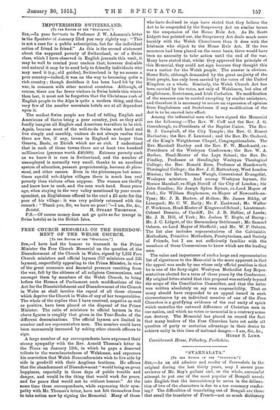FREE CHURCH MEMORIAL ON THE DISENDO W- MEET OF THE
WELSH CHURCH. [To vas Melva or vas "Srscraroa"] Stu,—I have had the honour to transmit to the Prime Minister the Free Church Memorial on the question of the Disendowment of the Church in Wales, signed by 1,252 Free Church ministers and official laymen (717 ministers and 535 laymen), respectfully appealing to the Prime Minister, in view of the great economic and financial pressure resulting from the war, felt by the citizens of all religious Communions, and amongst them by members of the Welsh Church, to bring before the Houses of Parliament such modifications of the Act for the Disestablishment and Disendowment of the Church in Wales as shall involve the repeal of all those clauses which deprive the Church in Wales of any of her temporalities. The whole of the replies that I have received, negative as well as positive, have been placed at the disposal of the Prime Minister. The ratio of ministers to official laymen in the above figures is roughly that given in the Year-Books of the different denominations. The official laymen are limited in number and are representative men. The number could have been enormously increased by asking other church officers to sign.
A. large number of my correspondents have expressed their strong sympathy with the Rev. Arnold Thomas's letter in the Times on January 12th, in which he pays a deserved tribute to the warmheartedness of Welshmen, and expresses his conviction that Welsh Nonconformists wish to live side by side in goodwill with their Anglican brethren. He affirms that the abandonment of Disendowment " would bring us great happiness, especially in these days of public trouble and danger, and would be the thing that would work for peace, and for peace that would not be without honour." At the same time these correspondents, while expressing their sym- pathy with Mr. Thomas's letter, have not felt themselves free to take action now by signing the Memorial. Many of those
who have declined to sign have stated that they believe the Act to be suspended by the Suspensory Act on similar terms to the suspension of the Home Rule Act. As Dr. Scott Lidgett has pointed out, the Suspensory Act deals much more harshly with the Welsh Churchmen than it does with the Irishmen who object to the Home Rule Act. If the two measures had been placed on the same basis, there would have been no necessity to take action until the end of the war. Many have stated that, whilst they approved the principle of this Memorial, they could not sign because they thought this was a matter for the Welsh people. The answer is obvious. Home Rule, although demanded by the great majority of the Irish people, has only been carried by the votes of the United Kingdom as a whole. Similarly, the Welsh Church Act has been carried by the votes, not only of Welshmen, but also of Englishmen, Scotchmen, and Irish Catholics. No modification of the measure can be carried excepting by similar assistance, and therefore it is necessary to secure an expression of opinion from Englishmen and Scotchmen if any modification of the Act is to be carried into effect.
Among the influential men who have signed the Memorial are the following :—The Rev. W. Cuff and the Rev. J. G. Greenhough, ex-Presidente of the Baptist Union. The Rev. R. J. Campbell, of the City Temple; the Rev. G. Ernest Darlastou ; the Rev. F. Lenwood ; and the Rev. Dr. Orchard, of the King's Weighhouse Chapel, Congregationalists. The Rev. Marshall Hartley and the Rev. F. W. Macdonald, ex. Presidents of the Wesleyan Conference ; the Rev. W. A. Barber, Head-Master of the Leys School; the Rev. Dr. Findlay, Professor at Headingley Wesleyan Theological College; the Rev. Ronald Rees, Professor at Handswo•th Theological College; the Rev. J. E. Rotten bury, West London Mission; the Rev. Thomas Waugh, Connexional Evangelist, Wesleyan ministers. And among Wesleyan laymen, Sir Horace Marshall, ex-High Sheriff of the City of London; Sir John Bandies; Sir Joseph Sykes Rymer, ex-Lord Mayor of York ; Sir William Stephenson, ex-Mayor of Newcastle-on- Tyne; Mr. J. R. Barlow, of Bolton; Mr. James Bibby, of Liverpool; Mr. C. W. Early; Mr. F. Eastwood; Mr. Walter P. Workman, Head-Master of Kingewood School ; Lieutenant- Colonel Dennis; of Cardiff; Dr. J. B. Heiner, of Leeds; Mr. J. R. Hill, of York ; Mr. Joshua T. Hoyle, of Bacup: Mr. J. C. Lidgett, of the Bermondsey Settlement ; Mr. Samuel Osborn, ex-Lord Mayor of Sheffield; and Mr. W. F. Osborn. The list also includes representatives of the Calvinistic Methodists, Primitive Methodists, Presbyterians, and Society of Friends, but I am not sufficiently familiar with the members of these Communions to know which are the leading men.
The value and importance of such a large and representative list of signatures to the Memorial is the more apparent in that the appeal was made by one whose only official position is that he is one of the forty-eight Wesleyan Methodist Lay Repre- sentatives elected for a term of three years by the Conference. My original letter stated that this proposal was entirely beyond the scope of the Conciliation Committee, and that the letter was written absolutely on my own responsibility. That no many should have responded to an appeal issued in such
circumstances by an individual member of one of the Free Churches is a gratifying evidence of the real unity of spirit which underlies the outward difference of Christian men in our nation, and which no votes or memorial in a contrary sense can destroy. The Memorial has placed on record the fact that many leaders of the Free Churches have set aside all question of party or sectarian advantage in their desire to achieve unity in this time of national danger. —I am, Sir, Sm., HENRY S. LONE.
Corriebruach Home, Pitlochry, Perthshire.


















































 Previous page
Previous page